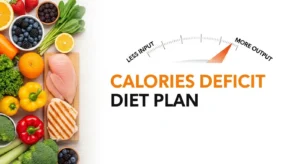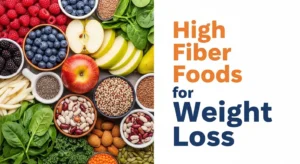I used to think a plant-based diet for weight loss meant salads and no flavor – but I was so wrong! Switching to mostly whole plants (fruits, vegetables, beans, whole grains) was literally like trading a heavyweight gym bag of junk for lightweight, power-packed food. Not only did I start losing weight fast, but I felt full and energized.
Research backs this up: a plant-based diet for weight loss is naturally low in fat and high in fiber, so you stay satisfied on fewer calories.
In fact, one meta-analysis found that following a plant-based diet for weight loss led to about 6–12 pounds of weight loss on average, and many people lose around 10 lbs without even counting calories!
Why a Plant-Based Diet Helps You Lose Weight
Plant foods like veggies, fruits, beans, and whole grains are filled with fiber and water. Think of fiber as nature’s bodyguard for your appetite: it bulks up food without adding calories, so you feel full longer.

Many plant foods also have high water content (like cucumbers, leafy greens, broccoli), which fills you up without the extra “fuel.” As experts explain, this means plant-based meals let you satisfy hunger on lower caloric density foods.
- Less fat, more fiber: Plant-based diets are typically lower in fat and higher in fiber than meat-heavy diets. Fiber slows digestion and keeps blood sugar steady, reducing hunger pangs. For example, swapping a meaty burger (high-calorie) for a black bean burger (fiber-rich, filling) can save hundreds of calories and still satisfy you.
- Volume eating: I love that I can eat huge portions of veggies and still lose weight. Studies show people on vegan/plant diets often eat more food by volume but fewer total calories, because plant foods have lower energy density. It’s like filling a fuel tank with premium fuel instead of sludge – you go farther on less.
- Natural calorie control: Good news — you usually don’t have to obsess over counting calories. In one review, people who simply switched to a vegetarian diet lost an average of 10 pounds over about 11 weeks without tracking calories or upping workouts. Essentially, the plant-based foods do the work by keeping excess calories off your plate.
- Healthy habits stack up: Going plant based diet for weight loss often leads you to cook more and skip sugary snacks. This “falling domino” effect means you naturally cut calories and improve diet quality. It's not just weight loss — many people see better blood pressure and energy levels too.
If you picture my diet shift, it was like clearing out clutter from a closet – out went the heavy processed junk and in came nature’s bounty of vegetables, beans, and whole grains. Over a few months, this simple swap helped me lose weight and feel lighter.

My Journey: Losing Weight with Plants
I’ll be honest – I was skeptical at first. Could I really give up burgers and still be happy? But after a couple weeks of loading my plate with steamed broccoli, lentils, and brown rice, the scale started moving down.
For example, I used to have cereal and milk for breakfast; I swapped that for oatmeal with berries and almond milk. Lunch went from cold cuts to giant salads or veggie soups, and dinner swapped steak or chicken for dishes like chickpea curry or lentil chili. The analogies fit my experience: it was like switching from a heavy down coat to a cool, lightweight jacket – I felt so much lighter.
By cutting out meat, cheese, and fried foods, I was eating literally more food on my plate but way fewer calories. Because I was full, I naturally ate smaller portions of high-calorie items. In the first 3 months I lost about 12 pounds without feeling like I was starving.
As Dr. Neal Barnard puts it, a plant-based diet can help you lose weight “without counting calories and without ramping up your exercise routine” – and that’s exactly how it felt for me. I wasn’t exercising extra; I just made smarter food swaps.
Eventually I realized this plant-based lifestyle wasn’t a “diet” I had to dread, but a change I could actually stick with. I found tons of satisfying recipes: creamy avocado smoothies in the morning, spicy black bean tacos for lunch, peanut noodles with veggies for dinner, and even a fruit-and-banana “nice cream” or dark chocolate as an occasional dessert. I realized I could lose weight with delicious food: almond butter on toast or a hearty vegetable stew never felt like deprivation.
Foods That Helped Me Lose Weight
- Leafy greens & veggies: Spinach, kale, broccoli, zucchini, carrots – I could eat giant salads or platefuls of stir-fried veggies with no guilt. They fill your plate and belly for very few calories.
- Whole grains: Brown rice, oats, quinoa, barley – these give you energy and fiber. I often start my day with oatmeal or whole-grain toast. Whole grains are slow to digest, so they keep you full longer.
- Legumes: Beans, lentils, chickpeas, peas – my go-to protein+fiber source. Dishes like lentil soup, black bean chili, or curried chickpeas became staples. Legumes are very satisfying, and studies show they help you eat less overall.
- Fruits: Berries, apples, bananas – naturally sweet, yet packed with fiber. They were my snack go-to (plus vitamins). For dessert I’d blend frozen bananas into a creamy ice-cream-like treat or top oatmeal with berries.
- Nuts & seeds (in moderation): Almonds, walnuts, chia seeds, flaxseeds – a small handful adds healthy fats, protein, and crunch. A sprinkle of flax in smoothies or a spoon of almond butter on toast can really satisfy hunger.
- Smart swaps: I minimized oils and heavy sauces (they’re calorie-dense). For example, using herbs, lemon juice, salsa or low-sodium soy sauce to flavor foods instead of butter or cream. I also switched to unsweetened plant milks and used nut butters or hummus to add creaminess instead of butter and cheese.

How to Get Started and Keep Going
Getting started was simpler than I expected. Here are some steps I took, and you can too:
- Start slow: You don’t have to flip overnight. I started with “Meatless Mondays,” then gradually added more plant meals each week until most of my meals followed a plant based diet for weight loss approach. Any increase in veggies is progress.
- Plan your meals: Keep a list of go-to recipes and do some meal prep. I’d cook a big pot of quinoa and beans on Sunday so I could quickly assemble meals during the week. Planning helped me avoid grabbing fast food.
- Use spices and sauces: Herbs, spices, salsa, lemon, and vinegars make plant foods tasty. I used things like garlic, curry powder, chili flakes, and fresh herbs to keep meals exciting. Flavor makes it easier to stick with healthy foods.
- Pack fiber and protein: Make sure every meal has vegetables (fiber) and a protein source like beans, tofu, lentils or nuts. This combo is super filling. I always had beans or tofu in my lunch or dinner, and often nuts or seeds in snacks.
- Make it delicious: You don’t have to eat rabbit food. I found creative recipes – hearty vegetable curries, chili, veggie burritos, big pasta salads – that tasted amazing. Even “treats” like a chocolate protein smoothie (with plant protein powder) or berries with coconut yogurt were part of my plan.
- Find support: Join online groups, follow plant-based bloggers, or team up with a friend. I found motivation in stories and recipes from others on the same journey.
(Affiliate note: For extra guidance, I personally followed a Plant-Powered 30-Day Meal Plan – it provided simple recipes, shopping lists, and daily tips to keep me on track. It was a game-changer for starting out.)
Over time, the weight kept coming off. Now I feel energetic and healthy. My clothes fit better and I have way more stamina. The best part? I never felt deprived, and these new habits have really stuck as a lifestyle.
FAQ
Can I lose weight on a plant-based diet?
Yes! Many people (including me) have lost weight this way. Studies show strong results: for example, higher-weight person following a vegan diet lost about 13 pounds in 16 weeks on average. It works because whole plant foods are packed with fiber and nutrients but relatively low in calories, so you naturally consume fewer calories without feeling hungry.
What should I eat on a plant-based diet to lose weight?
Focus on whole, minimally processed foods: plenty of vegetables (especially leafy greens, broccoli, zucchini), fruits (berries, apples, bananas), whole grains (oats, brown rice, quinoa) and legumes (beans, lentils, chickpeas). Aim to fill half your plate with veggies, one-quarter with whole grains, and one-quarter with beans/tofu or another protein. Snack on fruit, nuts, or veggie sticks. Avoid (or limit) sugary drinks, fried foods, and processed snacks – these pack extra calories without making you feel full.
How quickly will I see results on a plant-based diet?
Everyone’s body is different, but many people notice changes within a few weeks. I lost about 4–5 pounds in the first month of eating plants. Generally, expect steady weight loss of around 1–2 pounds per week if you stick with it. In clinical trials, participants often lose 5–10% of their body weight over 3–6 months on a vegan diet. The key is consistency: small weekly losses add up over time.
Do I need to count calories or exercise more?
Not really. One great thing about plants is that you often don’t have to obsessively count calories. In fact, as mentioned, people lost about 10 pounds just by switching to a plant diet without changing their exercise. Of course, light exercise (walking, yoga, weight training) can speed things up and improve fitness, but you can lose weight simply by making these food swaps. For me, the weight loss was a natural side-effect of eating differently.
Does a plant-based diet help with fat loss specifically?
Yes – plant-based diets tend to be low in unhealthy fats and high in fiber and nutrients, which helps your body burn fat more efficiently. For example, in one study, heavier participants on a whole-food vegan diet lost 11.5 kg (about 25 lbs) over a year, while the control group on a standard diet hardly lost any weight. In practice, eating mostly plants can reduce body fat (and often belly fat) while preserving muscle.
Will I get enough protein on a plant-based diet?
Absolutely. Beans, lentils, chickpeas, peas, tofu, tempeh, seitan, nuts and seeds are all protein-rich. Most people actually get more protein than they need. Harvard Health notes that fiber-rich grains and legumes are “rich in protein” and, when combined (like rice and beans or a peanut butter sandwich), provide all essential amino acids. I make sure to include a plant protein at each meal, and it’s been more than enough for me – no extra powders required unless you like them.
Give it a try – a plant-based diet can truly transform your weight and health, just as it did mine.








